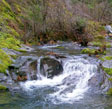| This article was published in the Independent Coast Observer on February 15, 2002. |
Courtesy Independent Coast Observer, Gualala, CA
Mendocino County Supervisor David Colfax is gearing up to fight off attempts by Alaskan, Japanese and Saudi interests to use Norwegian water bag technology to export water from two small rivers in his district to points south.
Last Friday, Colfax discussed the water bag export issue informally with citizens at Java Point in Gualala. Most of the 15 or 20 people who attended were concerned about the implications of the multi-national consortium in light of existing and proposed international trade laws and treaties.
Colfax urged them to support a resolution he introduced to the Mendocino County Board of Supervisors, opposing the water export proposals. He gave out copies of the resolution.
One clause reads, “WHEREAS, winter flows from the coastal rivers are essential for proper ecological functioning of the estuaries and near shore ocean conditions, resulting in improved fishery conditions, and providing attraction flows for adult fish;”
He also invited everyone to attend a meeting with members of the California Coastal Commission this Friday from 12:30 to 2:00 p.m. at the Stanford Inn Community Room in Mendocino.
The CCC may be another layer of protection from the projects, which would be the first use of water bags for bulk transport in the Western Hemisphere. The consortium has used such polyfiber bags to take water from Turkey to the Turkish part of Cyprus since 1997.
The California Department of Fish and Game and the National Marine Fisheries Service may also have a say, because the projects could “take” endangered coho salmon and steelhead.
“It becomes more and more complicated the longer we let it go,” said Colfax, who intends to be a proactive fighter. “It’s going to take a lot of work.” He cited as an example the successful efforts of many people to obtain Big River park funding.
The resolution opposing the projects was requested by Assembly Member Patricia Wiggins, who represents Napa, Vallejo and part of Santa Rosa.
“No amount of environmental review or project study could ever show that depleting Northern California’s rivers to fuel Southern California growth is worth doing,” wrote Wiggins.
On Tuesday, the opposition resolution passed on the consent calendar. When Planning Director Ray Hall gave his report, Supervisors asked him if the water bag proponents applied for any county permits; he replied that they have not and he would need to get in touch with them to find out what they plan before he can determine what permits would be required.
In a radio interview Tuesday evening on the Ecology Hour on KZYX/Z. Project proponent Ric Davidge said he regards the water appropriation permits from the State Water Resources Control Board Division of Water Rights as the keystone. He applied for those in September, 2000, and his applications were accepted in June, 2001.
Davidge said the Division of Water Rights will issue public notice of the projects in March. His companies have paid application fees and Department of Fish and Game fees.
He insists his projects would have no environmental effects because they would take water that flows in the alluvial gravel below the river bed, collect it in 24-inch pipes, and load it into the bags offshore. Two callers pointed out that his proposed intakes are miles below the highest intrusion of salt water in each river.
The projects would provide local jobs in safety and monitoring, on-site supervision of the bag and tug systems for people who qualify, Davidge said.
 Friends of Gualala River Protecting the Gualala River watershed and the species living within it
Friends of Gualala River Protecting the Gualala River watershed and the species living within it
